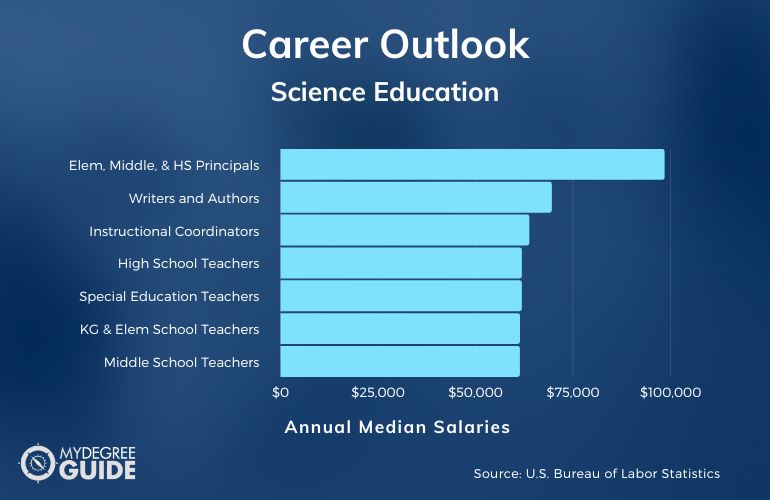If you love both science and teaching, you might be interested in earning a bachelor in science education. Science educators help students in schools and other settings learn more about the world around them.

As a science education major, you could prepare for state teaching licensure and get ready to lead your own classroom someday.
Editorial Listing ShortCode:
Let’s take a look at what’s involved in a bachelor’s in science education degree and how it could be the first step toward a fulfilling career as a teacher.
Universities Offering Online Bachelor in Science Education Degree Programs
Methodology: The following school list is in alphabetical order. To be included, a college or university must be regionally accredited and offer degree programs online or in a hybrid format.
Appalachian State University
Appalachian State University offers an online Bachelor of Science in Middle Grades Education with a concentration in Science. A full-time internship is required during the final semester, and the department provides assistance in finding a location. The program is designed to lead to professional licensure in the state of North Carolina.
Appalachian State University is accredited by the Commission on Colleges of the Southern Association of Colleges and Schools.
Arizona Christian University
A Bachelor of Science in Secondary Education can be earned at Arizona Christian University. The program offers a biblical education and small class sizes. The student-to-faculty ratio is just 17-to-1, and the program’s instructors have extensive classroom experience. The curriculum is designed to teach research-based theory while also providing hands-on practical experiences.
Arizona Christian University is accredited by the Higher Learning Commission.
Drury University
Drury University offers a Bachelor of Science in Middle School Science Education. The program is for students seeking initial certification in fifth through ninth grades in the state of Missouri. Courses include Technology in the Classroom, Diversity and Social Justice in Education, Elementary Astronomy, Principles of Physics, and more.
Drury University is accredited by the Higher Learning Commission.
East Carolina University
East Carolina University has been training teachers since 1909. East Carolina’s science education bachelor’s degree program has a 100% job placement rate after graduation. Online courses are available. The program strives to prepare students for exams and other licensing requirements in the state of North Carolina.
East Carolina University is accredited by the Southern Association of Colleges and Schools Commission on Colleges.
Florida International University
Florida International University’s Bachelor of Arts in Earth Science Education provides a broad background in earth sciences, including geophysics, meteorology, soil science, and more. The program is designed to prepare students for teaching grades six through twelve. Students in the program can receive intensive field teaching experience and personal guidance from faculty.
Florida International University is accredited by the Southern Association of Colleges and Schools Commission on Colleges.
Miami Dade College
Miami Dade College offers a BS in Secondary Science Education with a specialization in Biology. Nearly 100% of the program’s students have passed the Florida Teacher Certification Exam, and nearly 100% have found immediate employment upon graduation. Students must complete an internship in person, but academic coursework can be completed entirely online.
Miami Dade College is accredited by the Southern Association of Colleges and Schools Commission on Colleges.
Midway University
Midway University offers a Bachelor’s in Middle School Science Education. The program is conveniently available online and aims to prepare students for teaching grades five through nine. The student-to-faculty ratio is 15:1, and online students have opportunities to meet with faculty face-to-face. The program meets the teaching certification requirements for the state of Kentucky.
Midway University is accredited by Southern Association of Colleges and Schools, Commission on Colleges.
University of North Dakota
The University of North Dakota offers a B.S.Ed. in Science Education. This is an on-campus program that provides broad preparation for teaching biology, chemistry, physics, and earth sciences. The curriculum emphasizes hands-on experience and critical reasoning. Students are also expected to participate in volunteer opportunities at local schools.
UND is accredited by the Higher Learning Commission.
Western Governors University
Western Governors University offers an online program for a Bachelor of Science in Science Education (Middle Grades). Most students finish within 36 months. The program is nationally recognized by the National Science Teachers Association. In addition to pedagogy, students also study ecology and environmental science, astronomy, physics, biology, and more.
Western Governors University is accredited by the Northwest Commission on Colleges and Universities.
Western New Mexico University
Western New Mexico University offers a bachelor’s degree in secondary education with an endorsement in science. Courses are available both online and on campus. The program emphasizes hands-on, practical skills and prepares students for licensure in the state of New Mexico.
WNMU is accredited by the North Central Association of Colleges and Secondary Schools.
Online Bachelor in Science Education Degrees

The world around you is a fascinating place. If you’re interested in the life processes of microorganisms, the forces that keep planets in motion, or the atmospheric conditions that create weather patterns, then a career in science could be right for you.
By choosing science education as your career path, not only can you enjoy science activities every day, but you can also cultivate a love for science among students. As an educator, you can have opportunities to introduce young people to the wonders of the scientific world. As a science education major, you may specialize in a specific branch of science. Your options could include:
- Biology
- Chemistry
- General science
- Physics
As a science education major, you’ll take a number of science courses and education courses. You’ll probably take at least one class from each of the major branches of science plus additional courses in your chosen area of specialty.
Editorial Listing ShortCode:
The classes can include virtual or hands-on labs. There will also be a course that covers science standards and content for the age group you want to teach. The education classes will address topics like curriculum design, instructional technology, and classroom management. You’ll learn about child development, learning styles, and education law as well.
Science education degrees often prepare college students for teaching careers in the upper grades, particularly middle school and high school. Some programs, though, may allow you to specialize in teaching younger students. Most science education programs get students ready to take state licensure exams. In order to teach in a public school, it’s necessary to be licensed.
To qualify for the licensure test, you’ll complete an approved sequence of education classes and do a supervised student teaching internship. Not all jobs require educators to be licensed, though. For example, you could run science camps or lead museum classes without state certification.
Common Bachelor’s in Science Education Concentrations

There are many different branches of science. Life sciences include biology and zoology. Physical sciences include chemistry and physics. While all branches of science have some similarities, their areas of focus can be quite different from one another.
For your bachelor’s degree in science education, you may specialize in one area rather than trying to become an expert in all of them.
- Biology. With a major in biology education, you’ll have classes related to evolution, genetics, cellular processes, and animal life. After graduation, you might be suited for a position as a life science or biology teacher, if you pursue teaching credentials.
- Chemistry. With a chemistry concentration, your curriculum will include a variety of general, physical, and organic chemistry topics. A teacher with this degree might lead physical science or chemistry classes.
- Earth Science. The courses for an earth science program may cover geology, oceanography, and astronomy. This specialization can help equip you to teach earth science or environmental science.
- Natural Science. If you want to split your time equally between all the major branches of science, then a natural science program might be a good fit for you. Also known as broadfield science, this concentration can help equip you to teach general science in the younger grades or lead a variety of science classes for middle or high schoolers.
- Physics. In this program, you’ll take multiple advanced physics, geometry, and calculus classes. Your studies can help prepare you to teach physical science or physics.
Even if you specialize in a certain type of science, you might take at least one class from each of the main branches.
Science Education Careers & Salaries

People who major in science education usually become teachers in public or private school settings. Science education jobs are available for teaching preschoolers through high schoolers.
While kids of any age can learn science concepts, the most specialized science education takes place in the higher grades. Being a school teacher usually requires state licensure, but not every science educator chooses to get licensed.
Others with this degree may work in various community settings. For example, museum educators or directors could launch their careers with a degree in science education. Writing science books for young learners is another option. That could include textbooks or books for home and library shelves.
According to the Bureau of Labor Statistics, education, training, and library occupations pay a median annual salary of $57,220.
| Careers | Annual Median Salaries |
| Elementary, Middle, and High School Principals | $98,420 |
| Writers and Authors | $69,510 |
| Instructional Coordinators | $63,740 |
| High School Teachers | $61,820 |
| Special Education Teachers | $61,820 |
| Kindergarten and Elementary School Teachers | $61,350 |
| Middle School Teachers | $61,320 |
| Museum Technicians and Conservators | $47,630 |
| Preschool Teachers | $30,210 |
| Teacher Assistants | $29,360 |
Salary rates vary among school districts and often increase with experience. Earning a graduate degree could lead to additional career opportunities. Pairing classroom experience with a master’s degree can help educators become school administrators.
Editorial Listing ShortCode:
Some administrators are principals, while others are curriculum directors or instructional coordinators. Graduate degrees are also required for teaching science at the college level. Full-time university professors typically have doctorates, with a doctorate in educational technology online being one such example, but a master’s degree may be sufficient for community college or adjunct faculty roles.
Science Education Bachelor’s Curriculum & Courses

Bachelor’s degrees usually require earning around 120 college credits. Many of those credits will be earned in science and education classes like those listed below.
- Biology with Lab: Through lectures and hands-on activities, this class may cover cells, evolution, genetics, animal life, plant life, and ecology.
- Chemistry with Lab: You’ll listen to lessons on atoms, the periodic table, stoichiometry and chemical reactions, and you’ll do lab work to reinforce what you’re learning.
- Classroom Management: This course can equip you with tools for engaging students, establishing systems, and guiding behavior so that everyone in your classroom can learn and grow.
- Development of Children and Teens: You’ll learn about the physical, emotional, and cognitive changes that kids go through as they mature.
- Education System: In this class, you’ll study the structure of the American education system and the regulations and standards that guide school practices.
- Educational Technology: You may learn about computer programs and other tech innovations that can make scientific knowledge more accessible to students.
- Fundamentals of Science Education: This course will provide an overview of the various branches of natural science and offer practical suggestions for teaching science to students.
- Literacy: Understanding students’ reading abilities may influence the instructional methods you use in your science classroom.
- Physics with Lab: As a physics student, you’ll have lectures and labs that help you learn more about waves, energy, magnetism, and electricity.
- Special Education: This class will prepare you to work with students with special needs and to provide appropriate accommodations.
A bachelors in science education will probably include a semester-long student teaching experience toward the end of the program.
How to Choose an Online Bachelors Degree in Science Education Program

Many colleges offer teacher training programs, so you’ll likely have a number of options available to you as you think about where to go to school. Thinking about the factors below may help you decide where to attend.
- Accreditation. To become a licensed teacher, it’s necessary to hold a degree from a regionally accredited college.
- Format. Some students prefer semester-long online classes, and others like fast-track classes that only last 8 weeks each. Also, some learners enjoy synchronous classes that have all students tune in at the same time, while others want to progress at their own pace.
- Grade range. You’ll probably need to enter a program that specifically trains you to work with a certain group of kids, such as early elementary students or high schoolers.
- Science branches. Not all schools offer concentrations in all areas. Some may focus on biological sciences, and others may focus on physical sciences.
- State compatibility. While most teacher education programs adhere to standards accepted nationwide, it’s strategic to verify that an out-of-state school will fulfill the licensure requirements in your state.
- Student teaching opportunities. Some schools may have established relationships with schools in your area, which could be helpful when it comes time to secure an internship site.
Thinking through your preferences and finding schools that align with them can help you pick the college that’s the best fit for you.
Admissions Requirements

Getting into college for a bachelor’s degree program often includes submitting materials like the following:
- ACT or SAT scores (not required for all college admissions)
- Application form and fee
- References letters from teachers or work supervisors
- Transcripts from high schools and any colleges you’ve attended
You may need to be admitted to a school’s education program separately after taking several college courses and achieving a certain GPA. For questions about your chosen school’s policies, you can consult an admissions counselor.
Accreditation

Colleges that meet certain standards are eligible to receive regional accreditation. To earn it, they have to be evaluated and approved by one of the country’s seven regional accrediting agencies.
You can trust the quality of the education you’ll receive from a regionally accredited school. Accredited schools can accept government financial aid. Their courses tend to transfer more easily to other schools, and a degree from an accredited school can help you qualify for graduate programs.
Editorial Listing ShortCode:
For aspiring teachers, regional accreditation may be essential. If your degree doesn’t come from a regionally accredited school, you may not be eligible to take your state’s licensure exam.
Science Education Licensure and Certifications
One of the most important steps to becoming a science teacher is earning a bachelor’s degree in education. Your degree will specify what grades and subjects you’re qualified to teach.
In addition, getting your state teaching license is essential if you want to work in public schools. To obtain your license, you’ll typically take one or more exams. You’ll also undergo a background check before working in a school. To establish yourself as a top-tier teacher, you may also want to pursue industry certifications, like the National Certificate for STEM Teaching.
Financial Aid and Scholarships

Financial assistance programs can help you pay for upfront tuition costs, if you qualify. You may be eligible to get government aid, such as grants or loans. Many students receive federal assistance, and some benefit from state-based programs as well. You can complete the Free Application for Federal Student Aid (FAFSA) to learn about your eligibility.
Scholarships are another popular source of funding. Often, these are given out by colleges. Other scholarships come from private groups or industry organizations. To receive scholarships, you usually have to fill out an application and wait to see whether you are selected for the award. In addition, some employers help their workers pay for college.
Science Education Professional Organizations

To be the best teacher you can be, it’s beneficial to have the support of others. You can network with like-minded educators by joining a professional organization.
- Association for Science Teacher Education (ASTE)
- National Center for Science Education (NCSE)
- National Science Teachers Association (NSTA)
Your membership dues might give you access to an array of resources that can sharpen your professional skills. Resources could include journals, newsletters, online forums, lesson plans, and webinars. Some groups even host annual conferences for science educators.
Can I Be a Teacher with a Bachelor of Science Degree in Science Education?

Yes, an education bachelors degree can help you become a teacher. It’s important to make sure that your chosen program is designed to prepare students for licensure and that it’s recognized by the state where you intend to teach. That way, after graduation, you can take your state’s licensure exam to become a certified teacher.
A bachelor’s degree and a teaching license are usually all that’s needed to launch your teaching career. In some states, though, you may have to get a master’s degree within a few years of beginning your teaching career.
What Can You Do with a Bachelor’s Degree in Science Education?

Many people who earn science education degrees choose to become teachers. They may teach preschool, elementary school, junior high, high school, or special education.
According to the Bureau of Labor Statistics, all public school teachers must be licensed by their states. Private schools don’t always require licensure. Other graduates become educators in non-school settings. They may work with young people in museums, camps, or community organizations.
Science education majors sometimes write textbooks or other educational content. Their materials could even be used in homes or schools.
How Long Does It Take to Get a Bachelors in Science Education Degree Online?

Most bachelor’s degree programs take 4 years to complete, particularly those that rely on traditional school calendars with 16 week semesters. It will likely take longer to finish if you enroll part-time. Some schools offer quicker online education degree programs thanks to year-round courses with accelerated terms.
Student teaching is an essential component of most science education bachelor’s programs and usually lasts about one semester. While it’s possible to fast-track other coursework, it’s necessary to complete a full-length internship in order to properly prepare for leading your own classroom someday.
Is a Bachelor in Science Education Worth It?
Yes, a bachelor in science education is worth it for many students. For you, becoming a teacher might fulfill a dream of working with young students. A degree in science education enables you to combine your love of teaching with your passion for science. Plus, there will always be a need for trained teachers who can educate a community’s children.
Editorial Listing ShortCode:
Over the next ten years, employment for education, training, and library occupations is expected to grow by 10%. The Bureau of Labor Statistics currently predicts 7% job growth for middle school teachers and 8% job growth for high school teachers.
Getting Your Bachelor of Science Education Online

Teachers shape children’s minds and can instill in them a love for learning. If you want to become a teacher who makes science come alive for kids, a bachelor’s degree in science education could help you reach that goal.
You can grow in your own science knowledge while also learning how to work with students. Online college classes from accredited schools, whether it’s an online bachelors or an online masters in science education, can also help you launch your teaching career. You can pair your online coursework with at-home labs and an in-person student teaching session.
To learn more about your options, you can check out accredited online programs in science education.
